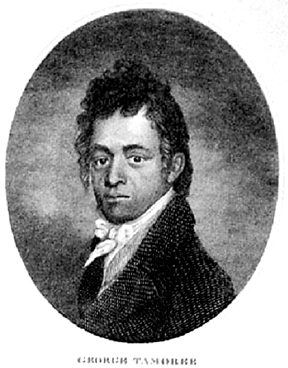
George Kaumuali‘i – Humehume as drawn by Samuel F. B. Morse prior to departure for Hawai‘i aboard Brig Thaddeus.
In searching for information on the life of pioneer Sandwich Islands Missionary Asa Thurston I came across new details on the life of George Kaumuali‘i-Humehume, the Prince of Kaua‘i, son of King Kaumuali‘i.
Most accounts of Humehume’s life in New England skip from his being sent aboard the American merchant ship Hazard to Boston by his father at the age of four. The cargo of sandalwood given to Captain Rowan of the Hazard was to pay for his education. Instead, the funds ran out early in his life in the Worcester, Massachusetts region. Usually an account will mention he worked as a carpenter’s helper, and as a hand on a farm, but little else.
These new insights into Humehume’s difficult years in New England were documented in about 1885. An elderly man who as a child knew Humehume well, asked to be heard during a talk before the Fitchburg Historical Society in Fitchburg, Massachusetts on the life of Sandwich Islands Mission missionary Asa Thurston. Asa grew up in Fitchburg, the son of a family of scythe makers who were town pioneers.
The man told of Humehume pulling him to school in a sled on a winter’s day, of the Hawaiian youth working in a tannery, probably in his early teens, of his losing his job due to his behavior, and of his likely hiding on a Fitchburg farm prior to going to sea as a Marine in the War of 1812.
Here’s the account from the 1885 edition of the Proceedings of the Fitchburg Historical Society.
About the year 1812, a boy thirteen or fourteen years of age, by the name of George Prince Tamoree, a native of the Sandwich Islands, was living in Fitch burg. He was the son of King Kaumualii, of the island of Kauai. George, who is called in some histories “Tamoree,” and in some “Kaumualii,” was brought to this country by an American sea captain, to whom he was entrusted by his father, either that he might obtain an education, or because the king’s wife, or more likely one of the king’s wives, was jealous of the boy, and the father wished to remove him from her sphere of influence. At any rate he came, and the captain who had charge of his funds, lost them, and the boy was thrown upon his own resources. Where or how he lived we do no tknow (except that at one time he was a carpenter’s apprentice) until he came to Fitchburg. Here he is known to have been in the family of Rev. Mr. Cutting, a Baptist minister, for a short time. Mr. Alonzo Goodridge remembers that the lad used to draw him to school on a sled, the school house being located a short distance beyond the poor farm, on the Wanoosnoc Hill road.
Afterward, Mr. Thomas Litch, who was the father of Charles S. Litch of this city, and of A. K. Litch, who formerly kept a hardware store on Main street, took the young fellow and employed him at his tannery, which was located at the intersection of Pearl and Townsend streets. Being punished by Mr. Litch for some fault, George ran away and never again made his appearance in Fitchburg, although Mr. Goodridge’s grandmother Pearce believed him to be in hiding for some time on their farm. He enlisted in the U. S. navy, was wounded in the engage ment between the Enterprise and the Boxer. He after wards went to the Mediterranean and was in an engage ment with an Algerine vessel. When the vessel returned to Charleston, S. C., some friends got him released from service and sent him to the school for heathen youth, at Cornwall, Conn.
George afterward returned to his home in the Sandwich Islands in the same vessel with Asa Thurston and the pioneer mission band. He met with a cordial reception from his father, King Kaumualii, who gave him a post of great importance in the kingdom, and a large and valuable tract of land. The king said, “I love Hoome (Hoome, the name given him by the natives,) very much more than my other children. I thought he was dead. I cry many times because I think he was dead. Some cap tains tell me he live in America. I say no, he dead. He no more come back. But now he come again. My heart very glad.”
